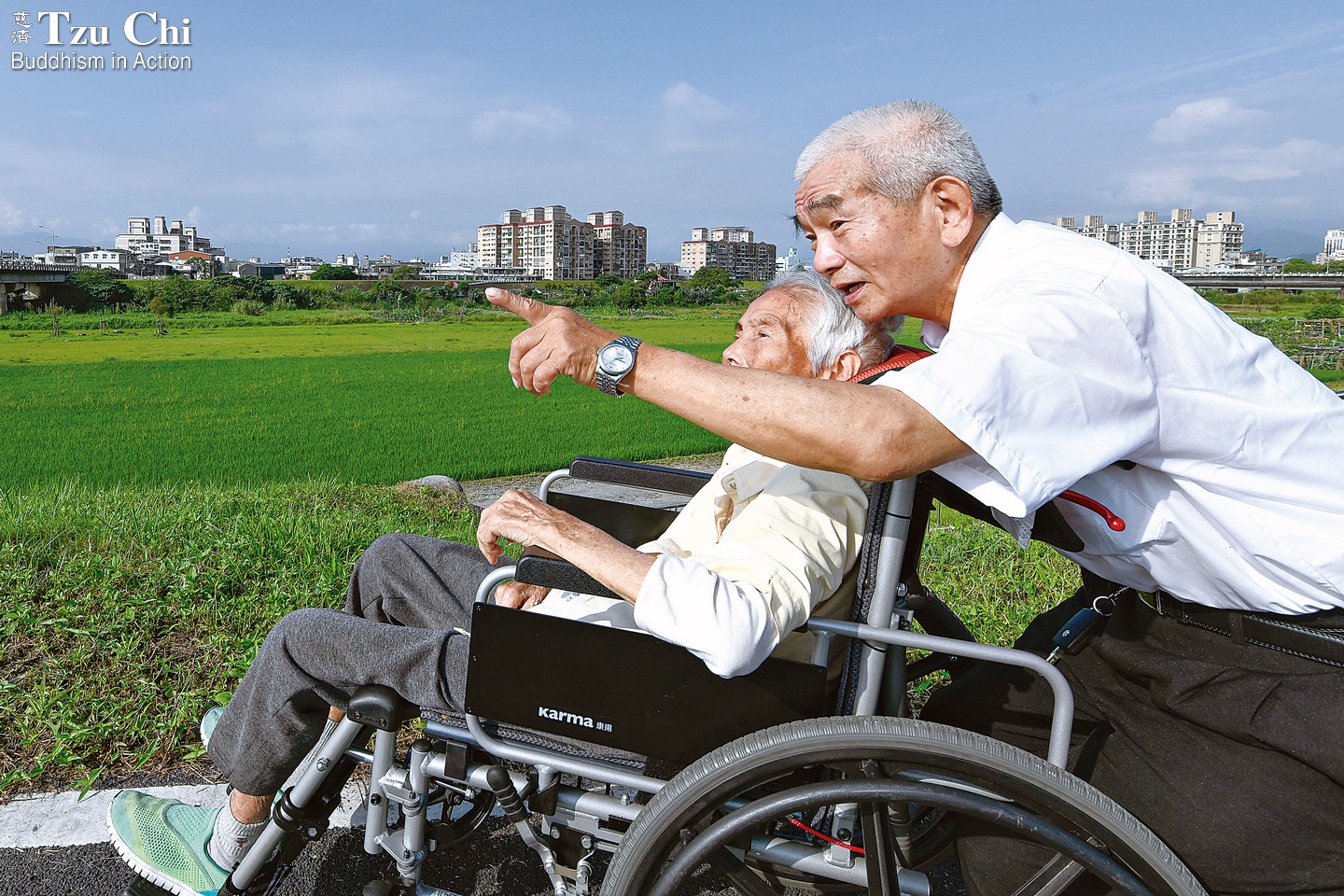By Liao Ming-yu
Translated by Wu Hsiao-ting
Photo by Yan Lin-zhao
When he becomes frustrated taking care of his mother, he tells himself not to let it get to him. “She’s sick—that’s why she needs my care,” he reminds himself.

It’s not uncommon for a caregiver to experience burnout, chronic fatigue, or sleep deprivation as they strive to provide good care for an aging or functionally impaired loved one. That’s why it is essential that caregivers ask for help when they need it. It’s also advisable that they not quit their job or give up their hobbies. Regular breaks and something to take their minds off caregiving for a time is often what it takes to keep a caregiver going.
Lin Ming-ji (林銘基) is his mother’s principal caretaker. He once was under so much pressure he felt he was near the breaking point. It was his volunteer work for Tzu Chi that kept him sane. He helps repair equipment for the foundation’s assistive device program. He finds that when he is completely focused on his repair work, his mind settles down and he feels at peace.
Every morning, Lin freshens his mother up and feeds her breakfast. Around ten, he carries her to his car, settles her inside, and drives to the Tzu Chi Yilan office, near where they live in Yilan, northeastern Taiwan. Once there, Lin sets to work repairing second-hand electric beds, wheelchairs, or other similar items while his mother sleeps peacefully in his car. These assistive devices will be provided for free to families with disabled or functionally impaired members. While he takes a breather from his job as a caregiver by fixing the equipment, he is happy knowing that the devices, when restored to proper working order, will ease the burdens of other caregivers.
Lin’s mother is 93. She had a fall three years ago and fractured her spine. Considering her advanced age, the doctors at the hospital decided not to operate on her. The only thing Lin could do was to take her home to recuperate. Bedridden, she was unable to tend to her own needs. Every time she was moved, she’d knit her brows and wail out of pain. Fortunately, Lin and his family had the help of a hired foreign live-in caregiver at the time.
In 2020, just as COVID-19 was sweeping across the world, that foreign caretaker returned to her home country. Then Taiwan’s government tightened their control on the entry of foreign laborers into the island, leading to a shortage of home care workers. Unable to find hired help for his mom, Lin was stumped. It just so happened that his job as a tour bus driver had also been severely impacted by the pandemic. No one wanted to travel for sightseeing during this time, which essentially put him out of work. He thought to himself, “Maybe this is an arrangement made by heaven?” So, just like that, he bravely took on the job of caring for his mother.
Lin’s mother was living with him and his family in a hilly community in Keelung, on the northern tip of Taiwan, when she suffered the fall. To get out of the home, they needed to negotiate some steep steps, which made it difficult to take her to the hospital or for an outing. As a result, Lin decided to move with her into a metal house next to his sister’s home in Yilan.
Ever since then, Lin has been his mother’s principal care provider. He is no longer young himself, being in his late 60s, but he doesn’t feel it is too much of a physical strain to tend to his mother’s daily needs on his own. He is still fit enough to move her out of and back into her bed every day. He finds changing her diapers or washing her the most challenging and frustrating of his responsibilities. His mother sleeps most of the time, and in her nebulous state of semi-wakefulness, she often doesn’t know that the person taking care of her is her son. She only knows he is a gray-haired man. As a result, she often puts up a big fight when he is trying to wash her or change her diapers. She is embarrassed to have her intimate needs cared for by a man.
When that happens, he says to her: “Mom, I’m your son! When I was little, you cared for me like this too. I grew up under your loving care. Now it’s my turn to care for you. Don’t be afraid.” It doesn’t matter whether his mother understands him. All Lin knows is that life has to go on.
Lin has been a Buddhist for many years. As such, he believes he and his mom couldn’t have become mother and son without forming karmic affinities over many lifetimes. Cherishing the bond between them, he tells himself not to let any difficulties he encounters in the process of taking care of his mother get to him. “She’s sick—that’s why she needs my care,” he says to himself.
Lin’s mother is only lucid about three or four hours a day. He makes good use of those precious hours by chatting as much as possible with her—about things that happened a long time ago or about their family members who are no longer around. His mother is always remarkably clear-headed during those times and talks fluently. Lin enjoys immensely the back-and-forth conversations with her. “That’s when I feel happiest,” he said.
Even though Lin feels he can still handle his mother alone, his family was worried that caring for her day and night, day in and day out, would eventually take a toll on him, especially as he was getting on in years himself. That’s why he applied at the beginning of this year for home care services offered by Taiwan’s government under its long-term care program. He especially hoped that a female care provider could come to his home regularly to bathe or shower his mother. His application was denied, however, because when the foreign care provider who used to care for his mother went back to her home country, she didn’t follow due exit procedures, thus disqualifying him from the government services. Fortunately, Lin’s wife later quit her job and joined him in Yilan, so he now has her to help care for his mom.
On a gloriously sunny morning following days of rain, Lin drove to the Tzu Chi Yilan office, parked his car next to the warehouse used to store assistive equipment, and said to his mom in the car: “Be good and take a good rest in the car. The sun is out today. Soak in the sunshine and make your bones stronger!” It used to be his mother who told him to be a good boy; now their roles have been reversed. Life is a cycle, and his mother is now his sweetest burden.



